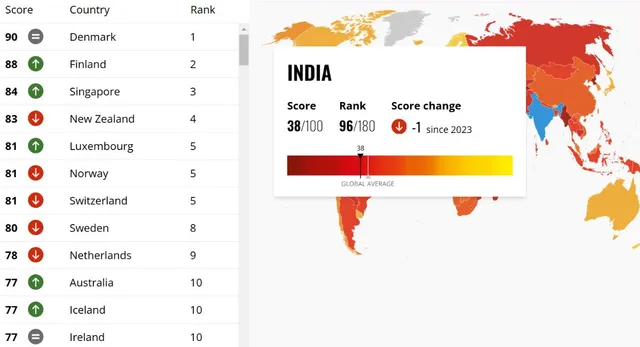Context:
The Corruption Perceptions Index (CPI) for 2024 has been released, revealing global corruption levels and ranking countries based on perceived public sector corruption.
Key Findings:
- India’s Rank: India holds the 96th position in the 2024 CPI, with a score of 38 out of 100, down from 39 in 2023. India is ranked 96th, dropping three positions from last year. The decline reflects ongoing corruption challenges despite efforts to address them.
- Global Rankings: Denmark leads as the least corrupt country, followed by Finland, Singapore, and New Zealand. At the bottom of the list, South Sudan is ranked the most corrupt with only 8 points.
- Neighbouring Countries: Among India’s neighbors, Pakistan ranks 135th, Sri Lanka is at 121st, Bangladesh stands at 149th, and China ranks 76th.
- Global Corruption: The report highlights a troubling global trend, with several nations, including the US, France, and Russia, experiencing declines in their CPI scores. Transparency International attributes these declines to political and economic factors, including authoritarianism and a lack of judicial accountability.
About the Corruption Perceptions Index (CPI)
The Corruption Perceptions Index (CPI), launched in 1995, has become the leading global measure of public sector corruption. It evaluates and ranks 180 countries and territories based on perceptions of corruption within their public sectors.
The index uses data from 13 external sources, which include reputable institutions like the World Bank, the World Economic Forum, private risk and consulting firms, think tanks, and other organizations. These sources collect the views of experts and business people, providing a comprehensive assessment of corruption levels.
The CPI employs a scale from 0 to 100, where 0 indicates high corruption, and 100 represents a very clean and transparent public sector. This index, compiled by Transparency International, serves as a global barometer of public sector misconduct and highlights concerns about rising corruption worldwide.
Corruption’s Impact on Climate Change:
The report also draws attention to the link between corruption and climate change, noting that a lack of transparency hinders climate action.
Corruption often leads to mismanagement of climate funds, obstructs policy efforts, and exacerbates environmental destruction.
Transparency International warns that climate-related corruption not only delays climate mitigation efforts but also impacts vulnerable populations disproportionately.
Conclusion:
While some countries have made progress, global corruption remains alarmingly high, affecting governance, democracy, and international stability. The CPI underscores the need for continued and enhanced global efforts to fight corruption, which is essential to ensuring fair governance, combating climate change, and fostering sustainable development.








